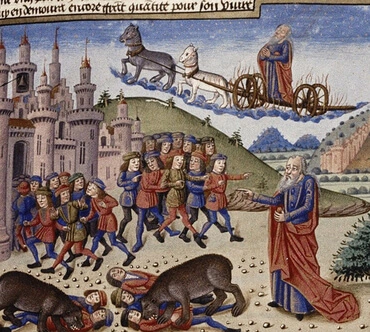1
Ðức Giê-hô-va phán cùng Sa-mu-ên rằng: Ngươi buồn rầu về việc Sau-lơ cho đến chừng nào? Ta đã từ bỏ nó, hầu cho nó không còn làm vua trên Y-sơ-ra-ên nữa. Hãy đổ dầu đầy sừng của ngươi và đi. Ta sẽ sai ngươi đến Y-sai, người Bết-lê-hem. vì trong vòng các con trai người, ta đã chọn một người làm vua.
2
Sa-mu-ên thưa rằng: Làm sao tôi đi đó được? Nếu Sau-lơ hay, thì sẽ giết tôi đi. Ðức Giê-hô-va phán cùng người rằng: Hãy đem theo ngươi một con bò cái tơ, và nói rằng: Tôi đến để dâng của tế lễ cho Ðức Giê-hô-va.
3
Ngươi sẽ mời Y-sai dự tế. Ta sẽ tỏ cho ngươi biết điều ngươi phải làm; rồi ngươi sẽ nhơn danh ta xức dầu kẻ ta chỉ cho ngươi.
4
Sa-mu-ên làm theo điều Ðức Giê-hô-va đã phán cùng mình, và đi đến Bết-lê-hem. Những trưởng lão của thành ấy đều lấy làm bối rối, chạy đón người, mà hỏi rằng: Có phải ông đến đem bình an chăng? Người đáp rằng: Bình an.
5
Ta đến để dâng của tế lễ cho Ðức Giê-hô-va; hãy dọn mình thanh sạch và đến ăn thịt tế lễ với ta. Người cũng dọn Y-sai và các con trai người cho thanh sạch và mời đến dự tế.
6
Khi chúng đến, Sa-mu-ên thấy Ê-li-áp, bèn thầm rằng: Quả hẳn, kẻ chịu xức dầu của Ðức Giê-hô-va đương ở trước mặt Ngài.
7
Nhưng Ðức Giê-hô-va phán cùng Sa-mu-ên rằng; Chớ xem bộ dạng và hình vóc cao lớn của nó, vì ta đã bỏ nó. Ðức Giê-hô-va chẳng xem điều gì loài người xem; loài người xem bề ngoài, nhưng Ðức Giê-hô-va nhìn thấy trong lòng.
8
Y-sai bèn gọi A-bi-na-đáp, và biểu người đi qua trước mặt Sa-mu-ên; nhưng Sa-mu-ên nói: Ðức Giê-hô-va cũng chẳng chọn người nầy. Y-sai biểu Sam-ma đi qua,
9
nhưng Sa-mu-ên nói: Ðức Giê-hô-va cũng không chọn người nầy nữa.
10
Y-sai biểu bảy con trai mình đi qua trước mặt Sa-mu-ên như vậy; thì Sa-mu-ên nói cùng Y-sai rằng: Ðức Giê-hô-va chẳng chọn một ai trong chúng nó.
11
Ðoạn, Sa-mu-ên nói cùng Y-sai rằng: Hết thảy con trai ngươi là đó sao? Y-sai đáp rằng: Hãy còn đứa con út, nhưng nó đi chăn chiên. Sa-mu-ên nói: Hãy sai gọi nó; chúng ta không ngồi ăn trước khi nó đến.
12
Vậy, Y-sai sai gọi người. Mặt người hồng hồng, con mắt xinh lịch, và hình dung tốt đẹp. Ðức Giê-hô-va phán cùng Sa-mu-ên rằng: Ấy là nó; hãy đứng dậy xức dầu cho nó.
13
Sa-mu-ên lấy sừng dầu, xức cho người ở giữa các anh người. Từ ngày đó về sau, Thần của Ðức Giê-hô-va cảm động Ða-vít. Sa-mu-ên đứng dậy đi về
a-ma.
14
Thần của Ðức Giê-hô-va lìa khỏi Sau-lơ; Ðức Giê-hô-va bèn khiến một ác thần khuấy khuất người.
15
Tôi tớ của Sau-lơ nói cùng người rằng: Nầy có một ác thần mà Ðức Chúa Trời khiến đến khuấy khuất vua.
16
Xin chúa chúng tôi hãy biểu những tôi tớ đứng chầu chúa tìm một người biết gảy đờn, để khi nào Ðức Chúa Trời sai ác thần đến chúa, thì người đó sẽ gảy đờn, và chúa sẽ được an ủy.
17
Sau-lơ đáp cùng các tôi tớ mình rằng; Vậy, hãy tìm cho ta một người gảy đờn hay, rồi dẫn nó đến cùng ta.
18
Một người trong vòng tôi tớ cất tiếng nói rằng: Nầy tôi đã thấy Một con trai của Y-sai, người Bết-lê-hem; nó gảy đờn hay, Một người chiến sĩ mạnh bạo, ăn nói khôn ngoan, và mặt mày tốt đẹp; Ðức Giê-hô-va ở cùng người.
19
Sau-lơ sai sứ đến Y-sai, mà nói rằng: Hãy gởi cho ta Ða-vít, con trai ngươi, là kẻ chăn chiên.
20
Y-sai bèn lấy bánh, một bầu da rượu, một con dê con còn bú, chất trên một con lừa, rồi nhờ Ða-vít con trai mình, gởi cho Sau-lơ.
21
Ða-vít đến nơi Sau-lơ, bèn ra mắt người. Sau-lơ thương yêu người lắm, đặt người làm kẻ vác binh khí mình.
22
Người sai đi nói cùng Y-sai rằng: Ta xin ngươi hãy cho Ða-vít đứng chầu chực ta; vì nó được ơn trước mặt ta.
23
Vậy, khi Ðức Chúa Trời khiến ác thần nhập vào Sau-lơ, thì Ða-vít lấy đờn và gảy. Sau-lơ bèn được an ủy, lành mạnh, và ác thần lìa khỏi người.








